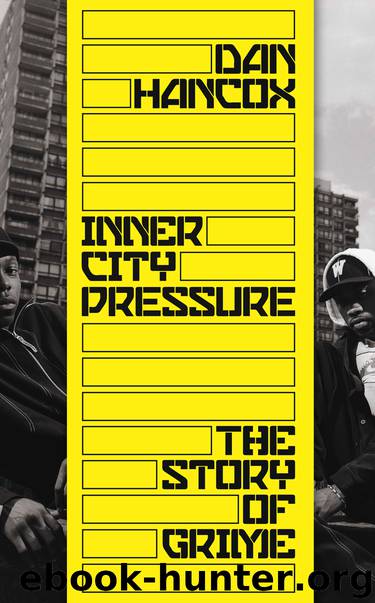Inner City Pressure by Dan Hancox

Author:Dan Hancox
Language: eng
Format: epub
Publisher: HarperCollins Publishers
Published: 2018-04-09T04:00:00+00:00
Unfortunately, grime’s live vitality was choked off before it could even begin to flourish, especially in the capital itself. The Metropolitan Police’s use of a ‘live music risk-assessment form’, Form 696, under the 2003 Licensing Act, gave them the power to determine whether an event might be a risk to public safety, and if it was, they required licence holders to provide the full names, addresses, telephone numbers, and dates of birth for all of the artists and promoters on the line-up, often with very little notice. If that wasn’t possible, they would take passports instead. Form 696’s motives were barely concealed: one question on the eight-page version made clear it was used for racial profiling: ‘Is there a particular ethnic group attending? If “yes”, please state group.’ Another section outlined the specific attention to black music: ‘Music style to be played/performed (e.g. bashment, R&B, garage)’, while another gave examples of types of musical artists as ‘DJs, MCs, etc’ – there was no mention of flautists or alto-sopranos.
At the exact moment grime began to take off, the Met began systematically monitoring, targeting and shutting down black music nights, with participation from Operation Trident, the specialist unit targeting black-on-black gang crime. The Met were comfortable with being independent arbiters of which artists or genres presented a risk, and sometimes would just bypass Form 696 altogether to directly shut out grime: ‘I was supposed to be playing in the grime room at the Music For You Festival,’ Logan Sama told me in 2007, ‘and the police actually said, “You can’t have a grime room.”’ These instructions were always given straight to the licence holders, the venue owners or management, rather than to the promoters – partly because they weren’t interested in a meaningful discussion about the possibility of trouble with people closer to the music, and partly because this way, the instruction is accompanied by a threat, either implied or explicit: ‘If you don’t comply, we could take away your licence.’ The Met became self-appointed experts in British urban music, happily reeling off lists of ‘risky’ genres, according to David Moynihan, a grime promoter in the mid-2000s: ‘[I was at] a meeting with council officials and the Met, when I was involved in putting on a community festival on the Hackney/Tower Hamlets border. The police told us categorically that we weren’t allowed to put on music that was “grime, garage, rap, reggae or R&B”. Funny that they knew what grime was when some of my friends don’t.’
The problem was not risk management in itself, but the blanket approach to entire genres, and the Met’s wilful lack of dialogue with promoters: the people booking the musicians, and the people who best know their crowd. Moynihan, who put on Dirty Canvas for two years in some unlikely venues – including the Whitechapel Art Gallery and the ICA – did not once hear from the police directly.
‘I’m surprised that they’ve been left out of the dialogue,’ Operation Trident’s Steve Tyler admitted to me at the time.
Download
This site does not store any files on its server. We only index and link to content provided by other sites. Please contact the content providers to delete copyright contents if any and email us, we'll remove relevant links or contents immediately.
Aircraft Design of WWII: A Sketchbook by Lockheed Aircraft Corporation(32139)
The Great Music City by Andrea Baker(30784)
Call Me by Your Name by André Aciman(19904)
The Art of Boudoir Photography: How to Create Stunning Photographs of Women by Christa Meola(18409)
The Secret History by Donna Tartt(18168)
Shoot Sexy by Ryan Armbrust(17559)
Plagued by Fire by Paul Hendrickson(17113)
Portrait Mastery in Black & White: Learn the Signature Style of a Legendary Photographer by Tim Kelly(16873)
Adobe Camera Raw For Digital Photographers Only by Rob Sheppard(16797)
Photographically Speaking: A Deeper Look at Creating Stronger Images (Eva Spring's Library) by David duChemin(16501)
Ready Player One by Cline Ernest(13996)
Pimp by Iceberg Slim(13781)
Bombshells: Glamour Girls of a Lifetime by Sullivan Steve(13689)
The Goal (Off-Campus #4) by Elle Kennedy(13203)
Art Nude Photography Explained: How to Photograph and Understand Great Art Nude Images by Simon Walden(12853)
Kathy Andrews Collection by Kathy Andrews(11328)
The Priory of the Orange Tree by Samantha Shannon(8618)
Thirteen Reasons Why by Jay Asher(8457)
The remains of the day by Kazuo Ishiguro(8399)
